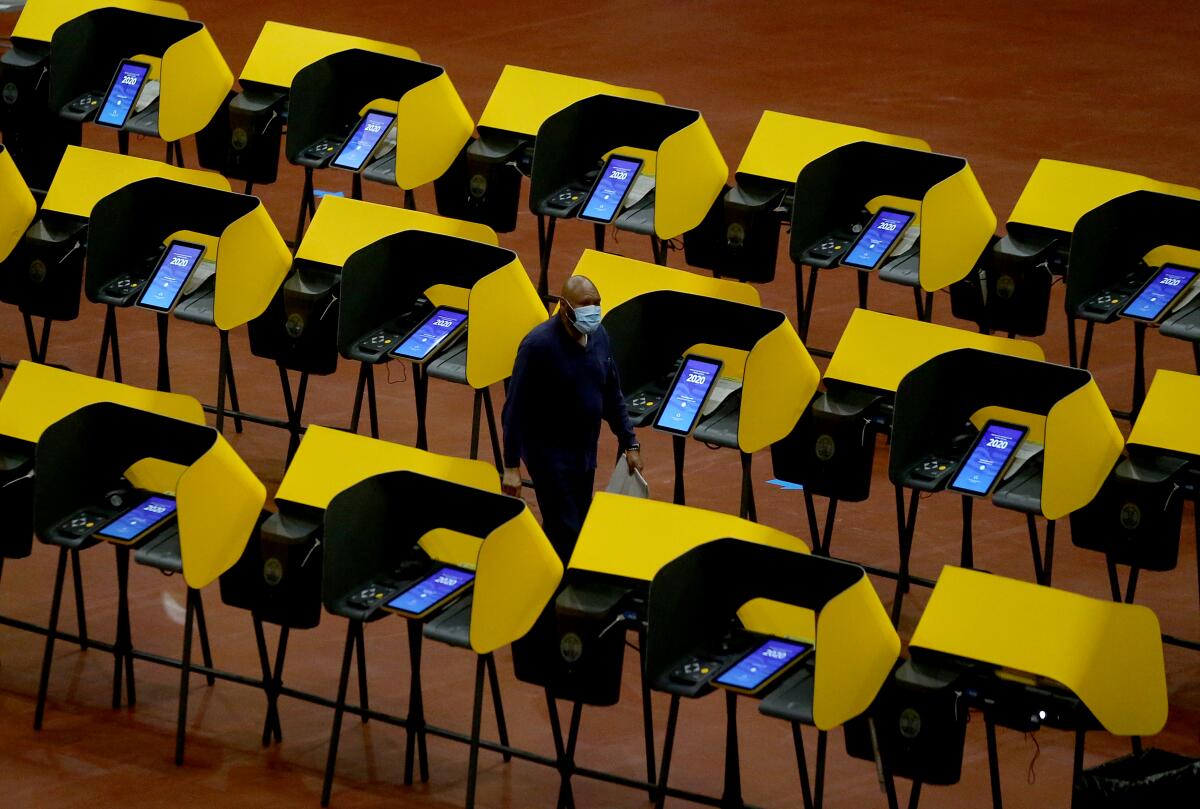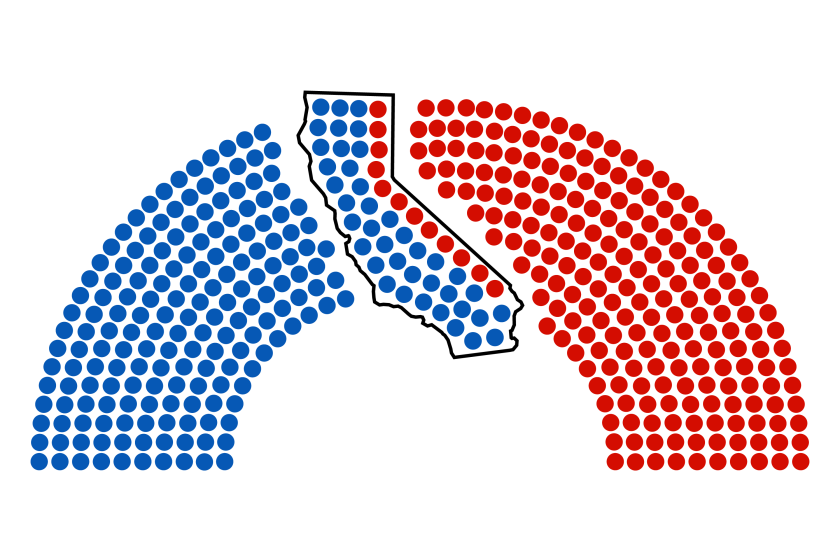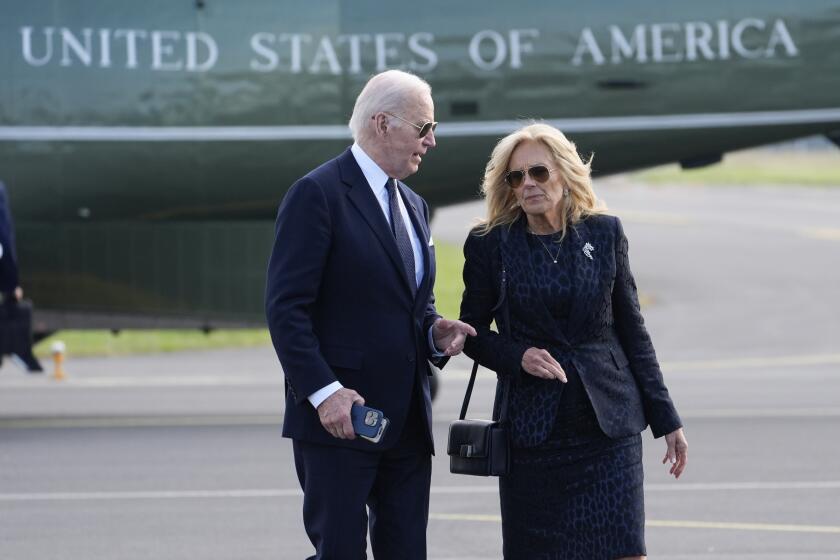Californians less likely to vote cite a common reason: They don’t like the presidential candidates

- Share via
Most Californians say they’re likely to vote in the November election, but among those who aren’t sure, there’s a common reason: They don’t like the presidential candidates.
That finding comes from a poll released Friday by the UC Berkeley Institute of Governmental Studies, which asked 5,095 registered voters across California to reflect on their likelihood of voting in the Nov. 5 general election, which will feature a rematch between President Biden and former President Trump.
The poll, conducted for the nonprofit Evelyn and Walter Haas, Jr. Fund, found that about 78% of California’s registered voters say they’re highly likely to vote. The poll also found that the intent to vote varies widely by age, race and political affiliation — as do the reasons why people say they aren’t likely to cast a ballot.
Californians who see themselves as highly likely to vote said participating in the presidential election is the leading reason. But among those who say they’re less likely to vote, 40% cited not liking the candidates for president as a reason. That rose to 55% among voters who have voted regularly in the past but aren’t sure whether they’ll vote this year.
Trump, a Republican, is now running as the first former president convicted of crimes after a jury last month found him guilty of falsifying records in a scheme to conceal payments to a porn actor who alleged they’d had an affair. Biden, a Democrat, is facing criticism from some in his own party over his support for Israel in its war against Hamas, as well as his moves to restrict asylum at the Mexico border. And both are facing questions about their age: Trump is 78 and Biden is 81.
“The presidential election seems to be cutting both ways,” said Mark DiCamillo, the director of the Berkeley IGS poll. “It’s a motivating factor for those who are already on board and likely to vote, but it seems to be inhibiting others.”
Democrats and liberals were more likely than Republicans and conservatives to say that their dislike of the presidential candidates is one reason they may not vote, the poll found.
More than 1 in 3 voters in the state said they weren’t likely to vote because “special interests and big money are controlling things,” and almost 3 in 10 voters said they weren’t well informed about the issues and the candidates.
“It’s clear that when it comes to our politics, belief is low and cynicism is high,” Jonathan Mehta Stein, the executive director of California Common Cause, said in a statement.
California’s ballot on Nov. 5 will be a lengthy one, including the presidential election, a growing list of statewide ballot initiatives and several competitive legislative races that could determine which party controls Congress. Some races in purple areas are expected to be won on razor-thin margins.
Overall, the poll found that the groups that appear to be most inclined to vote are over the age of 65, white voters, Republicans, homeowners and those with post-graduate degrees.
The groups in which the fewest people said they were likely to vote include voters who are young, Black or Asian American, have no post-high school education, or are naturalized citizens.
“It’s pretty much what we’ve seen in past elections — that older voters, white voters, the better educated voters are the most likely to turn out,” DiCamillo said.
The likelihood of voter participation varied widely by race, the poll found. Among white respondents, 90% said they were highly likely to vote. The share was 66% among Black voters, 70% among Latino voters and 62% among Asian American voters.
California’s importance in any strategy to win control of the House in the November 2024 election is one of the few things Republicans and Democrats agree on.
The foundation provided special funding to focus on Asian Americans, California’s fastest-growing demographic group, DiCamillo said.
The poll used voter-roll information to find voters who requested voting materials in Chinese, Korean and Vietnamese, then asked the poll questions in those languages. (The poll always asks questions in both English and Spanish.)
The results give “a better read of those voting constituencies than we’ve ever had in the past,” DiCamillo said, and suggest that there are wide disparities in voting propensity among Asian Americans.
Nearly 2 in 3 Vietnamese Americans described themselves as highly likely to vote. That rate rose to 71% among other Asian American and Pacific Islander groups, including Filipino and Japanese Americans.
By comparison, slightly less than half of Korean Americans and 54% of Chinese Americans said they were likely to vote.
The poll also asked California’s registered voters what could make them more engaged in the general election.
White and Asian American voters were most likely to say that their chances of voting would rise if they felt that “ballot measures or candidates would advance my interests.”
Latinos were most likely to say that their chances of voting would increase if “election results were more trustworthy.” And Black voters most frequently said that they would be more likely to vote if they “had access to an unbiased and trusted source of news about the election.”
Biden is playing defense on immigration with his action to limit asylum claims. It’s one of his biggest political problems, interfering with his attacks on Trump.
Christian Arana, a vice president of the Latino Community Foundation, said in a statement that investment in voter education is crucial to ensure that voters “understand the significance of their vote and the influence they hold.”
Voters under the age of 30 were four times more likely than voters over 65 to say that “getting more information about how and when to vote” could improve their chances of participation.
They were also far more likely to say that their voting behavior could change if voting were more convenient, or if they had assistance from “a person or group that I trust to help me better understand the issues and the candidates.”
DiCamillo cautioned that 78% of respondents rating themselves as highly likely to vote does not mean a prediction of 78% turnout. Most voters have good intentions about voting, he said, “but they probably overestimate it.”
During the 2020 presidential election, more than 80% of registered voters cast ballots in California, the highest percentage since 1976.
The poll was conducted May 29 to June 4 in five languages. The margin of error for the overall sample of registered voters was estimated to be plus or minus 2 percentage points, and could be higher for subgroups.
More to Read
Get the L.A. Times Politics newsletter
Deeply reported insights into legislation, politics and policy from Sacramento, Washington and beyond. In your inbox three times per week.
You may occasionally receive promotional content from the Los Angeles Times.













